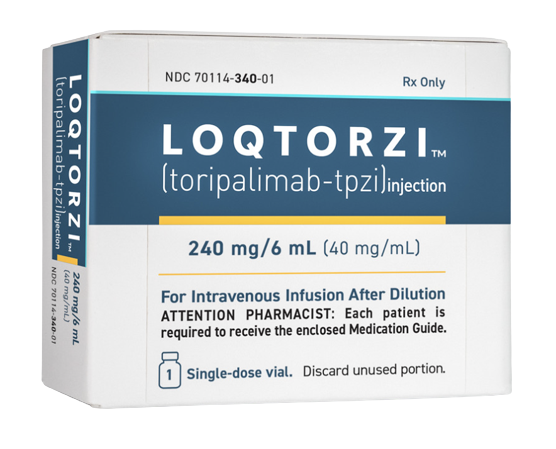Keytruda (pembrolizumab) vs Loqtorzi (toripalimab-tpzi)
Keytruda (pembrolizumab) vs Loqtorzi (toripalimab-tpzi)
Keytruda (pembrolizumab) and Toripalimab (Loqtorzi) are both immune checkpoint inhibitors, but they are approved for different indications and have different availability. Keytruda is widely used and FDA-approved for various types of cancers, including melanoma, non-small cell lung cancer, and head and neck cancer, and has a well-established safety and efficacy profile. Toripalimab, on the other hand, is a more recent addition to the class of PD-1 inhibitors and may not be as widely available or have as extensive a range of approved indications; it is important for patients to consult with their healthcare provider to determine which medication is most appropriate based on their specific medical condition, treatment history, and the availability of the drug.
Difference between Keytruda and Loqtorzi
| Metric | Keytruda (pembrolizumab) | Loqtorzi (toripalimab-tpzi) |
|---|---|---|
| Generic name | Pembrolizumab | Toripalimab-tpzi |
| Indications | Various cancers including melanoma, lung, head and neck, Hodgkin lymphoma, and others | Approved in China for nasopharyngeal carcinoma; under investigation for other cancers |
| Mechanism of action | PD-1 blocking antibody | PD-1 blocking antibody |
| Brand names | Keytruda | Loqtorzi |
| Administrative route | Injection (IV) | Injection (IV) |
| Side effects | Fatigue, musculoskeletal pain, decreased appetite, pruritus, diarrhea, nausea, rash, pyrexia, cough, dyspnea, constipation, pain in extremity, and headache | Similar to other PD-1 inhibitors: fatigue, fever, musculoskeletal pain, decreased appetite, and skin reactions |
| Contraindications | Individuals with hypersensitivity to pembrolizumab or its excipients | Individuals with hypersensitivity to toripalimab or its excipients |
| Drug class | Anti-PD-1 monoclonal antibody | Anti-PD-1 monoclonal antibody |
| Manufacturer | Merck & Co. | Shanghai Junshi Biosciences Co., Ltd. |
Efficacy
Introduction to Keytruda (pembrolizumab)
Keytruda, generically known as pembrolizumab, is a monoclonal antibody that has been widely recognized for its efficacy in the treatment of various cancers, including head and neck squamous cell carcinoma (HNSCC). As an immune checkpoint inhibitor, it works by blocking the PD-1 pathway, which cancer cells often exploit to evade the immune system. By inhibiting this pathway, Keytruda enables the reactivation of the immune response against cancer cells, providing a therapeutic strategy for patients with this challenging disease.
Efficacy of Keytruda in Head and Neck Cancer
The efficacy of Keytruda in head and neck cancer has been demonstrated in several clinical trials. In particular, the KEYNOTE-048 study, a phase III trial, showed that pembrolizumab alone or in combination with chemotherapy significantly improved overall survival in patients with recurrent or metastatic HNSCC compared to the standard of care. Patients whose tumors expressed PD-L1 with a combined positive score (CPS) of 20 or more showed the most significant benefit. This has led to the approval of Keytruda for the first-line treatment of patients with metastatic or unresectable recurrent head and neck squamous cell carcinoma.
Introduction to Loqtorzi (toripalimab-tpzi)
Loqtorzi, with the generic name toripalimab-tpzi, is another monoclonal antibody targeting the PD-1 receptor, similar to Keytruda. While toripalimab has shown promise in various cancers, its use in head and neck cancer is an area of active investigation. It is designed to work by helping the immune system to detect and combat tumor cells, potentially improving patient outcomes in HNSCC.
Efficacy of Loqtorzi in Head and Neck Cancer
Although toripalimab has been studied in clinical trials, as of the knowledge cutoff date in early 2023, it may not yet have received regulatory approval specifically for the treatment of head and neck cancer in many regions. Clinical trials are essential in establishing the safety and efficacy of new treatments like toripalimab for specific indications. Therefore, the efficacy of Loqtorzi in head and neck cancer would be determined based on the outcomes of these ongoing or future clinical trials, and the results would guide its potential approval and use for this indication.
Regulatory Agency Approvals
Keytruda
-
European Medical Agency (EMA), European Union

-
Food and Drug Administration (FDA), USA

-
Health Canada

-
Therapeutic Goods Administration (TGA), Australia

-
Medsafe (NZ)

Loqtorzi
-
Food and Drug Administration (FDA), USA

Access Keytruda or Loqtorzi today
If Keytruda or Loqtorzi are not approved or available in your country (e.g. due to supply issues), you can access them via Everyone.org.
How it works

Make an enquiry
Choose the medicine you want to buy, answer a couple of questions, and upload your prescription to speed things up. We’ll get back to you within 24 hours.


Make an enquiry
Choose the medicine you want to buy, answer a couple of questions, and upload your prescription to speed things up. We’ll get back to you within 24 hours.


Breeze through the paperwork
We'll guide you through the required documents for importing unapproved medicine, ensuring you have all the necessary information.


Get a personalized quote
We’ll prepare a quote for you, including medicine costs and any shipping, administrative, or import fees that may apply.


Receive your medicine
Accept the quote and we’ll handle the rest - sourcing and safely delivering your medicine.

Some text on this page has been automatically generated. Speak to your physician before you start a new treatment or medication.
Let's talk
If you have any questions, call us or send us a message through WhatsApp or email:
Contact us




